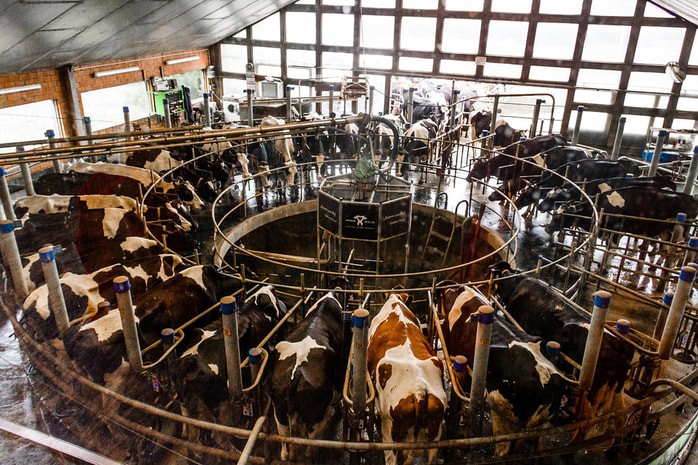MILK
IS IT REALLY AS GOOD FOR YOUR BONES
AS YOU HAVE BEEN LED TO BELIEVE?
- The March 1994 edition of the Journal of Epidemiology carried as study called Case-Control Study of Risk Factors for Hip Fractures in the Elderly. The Abstract stated that even though neither alcohol consumption nor caffeine were associated with hip fractures, “Consumption of dairy products, particularly at age 20 years, was associated with an increased risk of hip fracture in old age“.
- A few years later, the June 1997 issue of the American Journal of Public Health carried a similar study (Milk, Dietary Calcium, and Bone Fractures in Women: A 12-Year Prospective Study). Beginning in 1980, the authors followed over 75,000 women between the ages of 34 and 59 with no history of calcium supplementation. Listen to their conclusions. “We found no evidence that higher intakes of milk or calcium from food sources reduce fracture incidence. Women who drank two or more glasses of milk per day had relative risks of 1.45 for hip fracture when compared with women consuming one glass or less per week. Likewise, higher intakes of total dietary calcium or calcium from dairy foods were not associated with decreased risk of hip or forearm fracture. These data do not support the hypothesis that higher consumption of milk or other food sources of calcium by adult women protects against hip or forearm fractures.“
- A study that came out just last week in the latest issue of the British Medical Journal showed the same thing. Scientists have been following over 100,000 Swedish men and women for an average of 20 years in order, “to examine whether high milk consumption is associated with mortality and fractures“. Their conclusions? “High milk intake was associated with higher mortality in one cohort of women and in another cohort of men, and with higher fracture incidence in women.“
- Besides being the Chair and associate professor of health and wellness for the University of North Carolina Asheville, Dr. Amy Lanou is a senior nutrition researcher and director of the PCRM (Physicians Committee for Responsible Medicine — an organization with 15,000 physician members and the stated goal of “Bringing nutrition into medical education and practice“) PCRM’s bio on her says that, “Dr. Lanou publishes regularly on the relationship between dairy products and health concerns…. Another paper in Pediatrics, titled ‘Calcium, Dairy and Bone Health in Children and Young Adults: A Reevaluation of the Evidence,’ shows that currently available evidence does not support the notion that dairy product consumption promotes bone health in young people.“ Lanou goes on to say that the, “Countries with the highest rates of osteoporosis are the ones where people drink the most milk and have the most calcium in their diets. The connection between calcium consumption and bone health is actually very weak, and the connection between dairy consumption and bone health is almost nonexistent.“
Let me say that while I do not agree with everything espoused by Dr. Lanou and her organization (they have a strong vegan bent, and I firmly believe that a PALEO approach is better for both WEIGHT LOSS and dealing with CHRONIC INFLAMMATORY ILLNESSES), she is right on in her statements about Osteoporosis. Is you are interested in learning about the real causes of this all too common health problem, take a moment to read a few of the posts on OSTEOPOROSIS I have written over the past couple of years. Be warned; they might just shock you. Study after study has concluded that calcium supplementation not only does not prevent Osteoporosis, these supplements are actually associated with higher rates of mortality (death).
I think that in many ways, milk is in the same boat that grains are in (think GLUTEN here). It’s not that grains are bad in and of themselves. However, all of the genetic modifications, hybridization, and OTHER FACTORS have made them something which, in many ways, bears little resemblance to historical grains of a mere century ago. Think about it. Milk is pasteurized in order to kill bacteria (the good and the bad), right along with ENZYMES and nutrients. Then it’s homogenized (whole milk is forced through tiny holes at a very high pressure in order to keep the cream from separating from the milk). Before the milk ever gets to this point, it is generally “contaminated” with ANTIBIOTICS and various hormones (rBGH, XENOESTROGENS, etc). In many ways, processed milk is a “Frankenfood” along the same lines as a hotdog or CHICKEN NUGGET. On top of this, milk has been strongly associated with DIABETES, and certain types of CANCER (particularly PROSTATE and BREAST). Much of this is because processed milk is thought to create significant amounts of INFLAMMATION.
What do I recommend? Unfortunately, our local Organic Cheese Plant was shut down by the government (HERE), so I can’t send you to Morningland any more. We used Whole Goat Milk for our kids when they were infants, and have access to fresh whole milk today. One thing I do not recommend is Soy Milk as it is a known XENOESTROGEN.

